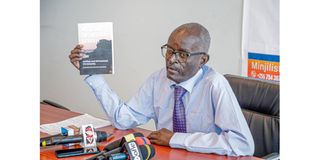New path or confusion?: Tanzanian man in quest to establish ‘African Christianity’

Evangelist Silvanus Ngemera showcases a book on his brainchild, ‘African Christianity’ titled: 'African Orthodox Derekh' as he speaks to journalists in Dar es Salaam on Friday.
What you need to know:
- A 67-year-old Tanzanian evangelist and theology scholar, Mr Silvanus Ngemera, has taken on the formidable task of founding an ”African Christianity” — a vision that aims to break away from “western influence” and establish what he described as the African Orthodox Derekh (way) Church.
Dar es Salaam. A new religious movement is emerging to establish the so called African Christianity as Tanzania and much of Sub-Saharan African countries are witnessing an unprecedented proliferation of denominations.
A 67-year-old Tanzanian evangelist and theology scholar, Mr Silvanus Ngemera, has taken on the formidable task of founding an ”African Christianity” — a vision that aims to break away from “western influence” and establish what he described as the African Orthodox Derekh (way) Church.
The Citizen recently reported on the surge of modern churches in Tanzania, many of which have shifted their focus towards preaching prosperity rather than spirituality.
The shift has not only sparked debate but also led to government intervention, with some self-proclaimed prophets being demoted for exploiting their followers.
“Christianity is the opposite of colonialism,” Mr Ngemera declared during a press conference in Dar es Salaam on September 6, 2024.
African independence in faith
His assertion underscores his belief that the Western Church, with its deep-rooted influence over African Christianity, represents a form of religious colonialism.
For Mr Ngemera, the time has come for African Christianity to grow up, just as a child eventually leaves the nest to become independent.
The evangelist’s argument rests on the premise that African Christianity has been under Western tutelage for over 300 years of evangelisation, facilitation, financing, and leadership by European denominations.
He argues that this has led to a fragmented church that, in many cases, no longer serves its spiritual purpose.
“We say thank you very much, Western Europe, for your evangelisation and financial support for several centuries, but it is now time to stand alone,” he emphasised.
He likens African Christianity to a grown man who must now stand on his own feet, free from the dominance of his parents.
Mr Ngemera also points to the influx of American Pentecostal denominations in Sub-Saharan Africa over the last 50 years as evidence of the fragmentation he seeks to address.
According to him, the denominations have created more division than unity and have contributed to a Christianity that is difficult to recognise.
Controversial vision?
Mr Ngemera’s proposal for an African Orthodox Church is not without its critics. Some argue that his vision, while noble, could lead to further confusion among believers already struggling to navigate the multitude of denominations and private churches.
“We are witnessing a crisis of faith,” says a pastor at a leading Protestant church in Dar es Salaam, Rev John Mushi.
“The introduction of yet another denomination, even under the guise of African unity, could exacerbate the problem rather than solving it,” he told The Citizen.
Moreover, Ngemera’s plan to abolish private preachers and churches across Sub-Saharan Africa raises significant concerns. While the idea of a unified African Church is appealing to some, others see it as an impractical goal in the region with as diverse and culturally rich as Africa.
“Africa’s strength lies in its diversity,” argues Dr Mariam Mchomvu, a religious studies expert, based in Dar es Salaam.
“To impose a single denomination on all Africans could stifle the very cultural expressions that Mr Ngemera seeks to preserve,” she said.
Another aspect of Mr Ngemera’s argument touches on the commercialisation of Christianity in Africa. He laments the current state of affairs, where money has become the central theme of many sermons.
“Christianity seems to have been consumed by money, and now we preach offerings instead of preaching God,” he said. Such a sentiment echoes the concerns of many Tanzanians who have witnessed the rise of prosperity gospel preachers who prioritise wealth accumulation over spiritual growth.
“The focus on money has diverted attention from the true essence of Christianity,” said Bishop Paul Mwakyoma of the Catholic Diocese in Mbeya.
“The church’s role is to guide its followers spiritually, not financially. The call for a return to the fundamentals of faith is timely, but it must be approached with caution,” he added
Mr Ngemera cites Ethiopia’s Orthodox Church as a model for what he envisions for the rest of Africa. Ethiopia, he argues, has managed to maintain its religious identity despite centuries of external influences.
He believes that Africa, too, can establish its Orthodox Church that reflects African values and traditions.
However, the Ethiopian experience may not be easily replicable across the continent, according to some experts.
“Ethiopia’s success with its Orthodox Church is deeply rooted in its history and culture,” noted a historian specialising in African religions, Mr Emmanuel Musiba.
“What works in Ethiopia may not necessarily work elsewhere in Africa, where the religious landscape is much more varied,” he said.
Mr Ngemera’s vision, while still in its infancy, has the potential to ignite significant change in the way Christianity is practiced in Africa but whether the change will lead to unity or further fragmentation remains to be seen.
“Once we succeed in separating, although it will not be easy, we must also rebuild our Theology, Catechism, and Liturgy,” Mr Ngemera noted, acknowledging the challenges that lie ahead.




